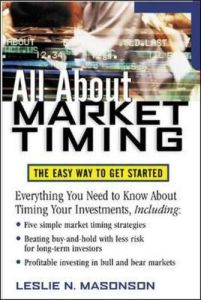Join getAbstract to access the summary!

Join getAbstract to access the summary!
Leslie N. Masonson
All About Market Timing
The Easy Way to Get Started
McGraw-Hill, 2003
What's inside?
You can make money timing the stock market, but only if you are tactical and unemotional. Greed and fear kill fortunes.
Recommendation
The preponderance of research for the past 100 years or so has demonstrated convincingly that stock markets are pretty efficient and that stock prices move randomly, or almost randomly. That is a strong argument against trying to time the market. Author Leslie N. Masonson disagrees, contending that if you use a few simple techniques to time the market, you can avoid losses and wind up with a more profitable portfolio than if you simply bought a representative selection of stocks and held them, as most financial advisors now recommend. He could have presented more evidence to support his opinion, but he is honest enough to contrast his point of view with the many arguments against attempting to time the market. He acknowledges that timing requires certain staunch character traits that are far from universally present in the investing populace. That is to his credit. Also to his credit, according to getAbstract.com, is the fact that he usefully defines and discusses a number of trading techniques and information sources that even non-investors should know about and that investors should understand.
Summary
About the Author
Leslie N. Masonson is president of Cash Management Resources, a financial consulting firm. A popular speaker, Masonson has written four books, including Day Trading On The Edge.
















Comment on this summary